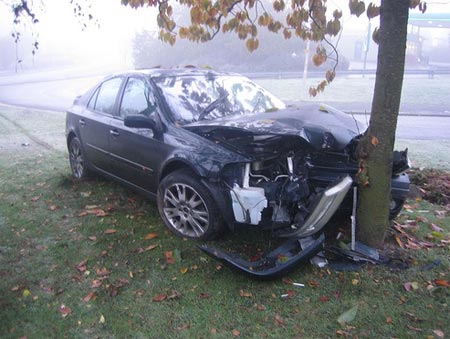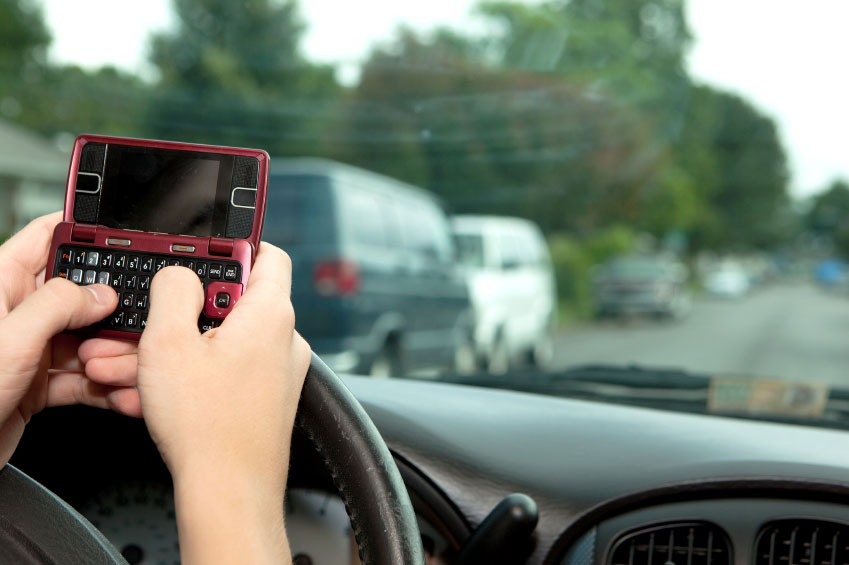It's really hard to be a parent and try to relate to what childhood is like for my kids. I know what it was like to be a tween and teen back in the 20th century, not what it's like today.
Parental Monitoring Is Smart During the '100 Deadliest Days' Driving
A deadly summertime car wreck is a parent's worst nightmare.
It’s the perfect time of year to apply a little overdose of parental monitoring – and keeps those kids safe during those sizzling summer months!
We're smack in the middle of the 100 deadliest driving days for teens aged 15 to 19, which fall between Memorial Day and Labor Day, according to AAA. Car wrecks are the leading cause of death for U.S. teens, and more teens are killed on the road during summer than any other time of year.
Kids Safety and Your Cell Phone Policy for Sleepovers?
When your children are old enough to carry their own cell phones, you can't help but breathe a sigh of relief. Now you have a way to get in touch with them wherever they are. They can call or text you if they need you. But sometimes, sexting and texting can make the cell phone a double-edged sword.
Do you let your kids take their phone to a party, especially sleepovers?
Sexting and Porn? Is Your Child Accessing Internet on Their Phone?
It's easy to focus on the desktop or laptop computer in our child's life and forget that the Internet is just as accessible from the cell phone hidden in their pocket. Previously we mentioned 4 reasons to monitor your child´s cell phone. Internet dangers don't become less prevalent or less serious because our kids are on a phone instead of a computer.
This week, take some time to evaluate whether you're allowing things on the smartphone that you wouldn't on the Internet, or vice versa. It's the same Internet, and the same rules should apply no matter how your child is accessing it.
If you've got a teenager with a phone, do you talk about how they're using it to go online? If you are guilty of monitoring computer usage more than phone usage, you're not alone.
20 Percent of Third Graders Own Cell Phones: Sexting Issue?
 This article was written by Heather Campobello from WebProNews.
This article was written by Heather Campobello from WebProNews.
A startling new study finds that kids are at risk for sexting, cyberbullying, and more at a much younger age than originally thought. A new study surveyed 20,766 children from grades 3-12 in Massachusetts. The findings are from a self-report so children may not
8 Red Flags for Apps on Facebook for Kids
10 Parental Monitoring Tips for Cell Phones
Following Mondays article on parental monitoring and why you should be doing it, I thought we'd follow up with some tips for monitoring his or her phone. I am noticing more and more teens scrolling through Facebook pictures and checking their emails using their mobile phone all the time. And it's not just me.
Facebook's recent acquisition of Instagram, a photo sharing app for mobile devices, shows that users are increasingly going online using a phone.
Even so, statistics show that far fewer parents monitor their child's cell phone as rigorously as they do other Internet-enabled devices, like a laptop or desktop PC. If this is you, don't feel bad – start keeping your kids safer today with these 10 parental monitoring tips for cell phones.
Using FourSquare as a Location Parental Monitoring Tool
Everyone these days belongs to some kind of social network - teens in particular are enamored with social media and facebook for kids. They love having the ability to know everything that their friends are doing at all times, all the time. One of those social networks is called FourSquare, and many of you know what it is, or at least heard it mentioned.
For those of you who don't know what FourSquare is; its a social network, most commonly used through an "App" on a mobile phone. Users are encouraged to "Check-in" when they arrive at any number of locations. Restaurants, bars, schools, offices and even homes and apartments have the ability to create a location where any user can "Check-in" and receive points for doing so. Companies most often use the service to promote deals and encourage visitors, but kids and teens most often use the social network as a game to see who can get the most points.
8 Signs Your Child Is Ready for a Cell Phone with Parental Controls
 It may not happen until your child is 16, or it could happen as early as 6 – sooner or later, he is going to ask you for a cell phone. And when your child does, how are you going to answer? Your child's safety is a big deal, especially on a mobile phone, and you might want to consider parental monitoring or parental controls.
It may not happen until your child is 16, or it could happen as early as 6 – sooner or later, he is going to ask you for a cell phone. And when your child does, how are you going to answer? Your child's safety is a big deal, especially on a mobile phone, and you might want to consider parental monitoring or parental controls.
A cell phone, especially a smart phone, is a big responsibility. Here are 8 indicators that your child is ready to handle one.
-
He has shown responsibility with other big-ticket personal items
Texting and Walking Can Be Hazardous, Too
We all know that texting while driving is dangerous – statistics agree that it's even riskier than driving drunk. But even if your child isn't even close to receiving his or her license, you're not off the hook just yet. Texting also presents a potentially fatal distraction while simply crossing the street.
In a recent study published by the University of Alabama, 10- and 11-year-olds were observed walking across the street in a simulated environment, several times while using their phones and several times while not using their phones. Researchers found that children using a cell phone took 20% longer to cross the road, were 20% less likely to look both ways, and were twice as likely to be hit by a car. Your kids safety may be affected by using their phones even when they are walking!
Cheating Via Mobile Phone: Do Schools Need Parental Controls?
Cell phones have changed everything in our kids' schools, including the way they cheat. The old ways of cheating (tiny crib sheets or notes written on the arm in ink) have been replaced with a new kind of digital cheating. Cell phones are tiny, ubiquitous, and easy to hide – and 1 in 3 kids say they've used their cell phones to cheat at least once in school. Do schools need to adopt some kind of parental controls?
Cheaters have a myriad of options when they've got a cell phone, particularly a smart phone, at their disposal. They can store notes, text friends for answers, search the Internet for answers, or take pictures of the test and forward it to friends who haven't taken it yet.
Read More »iZup App Prevents Texting While Driving to Keep Kids Safe
Aside from modeling good behavior by never using your own phone while driving, or having frequent conversations with your kids about the dangers of texting and driving, you can also use a mobile app like iZup to curb the temptation for your teen to text and drive and keep your kids safe.
The name iZup literally means “eyes up,” meaning that it keeps your teens from looking down at their phones when their focus needs to be on the road. iZup is compatible with Blackberry and Android, and it works using the phone's GPS.
Once the phone reaches 5 MPH (or another speed you select when you set up your account,) the app will automatically hold all incoming texts and calls. No outgoing texts or calls can be made, either, except for 911 or other numbers you authorize when you set up your account. It's a great app to enable parental controls in the car and help keep your kids safer
Currently, iZup is available for a subscription of $2.95 per month or $19.95 per year. You can put iZup on up to 5 phones with a family monthly subscription of $5.95 per month ($59.95 per year.)
Are Sexting and Texting Messaging Affecting Our Kids' English?
If you've seen one of your kids' text messages recently, you may have been concerned about what all that text-speak is doing to this generation's spelling, vocabulary, grammar, and general command of the English language. Do you need to?
It's true that text-speak is disconcerting to grammar purists, who shudder at the question “where u at?” or shortening entire phrases like “in my opinion” to “IMO.” Some English teachers also say they see too much informal language and too little structure in their student's writing, which could be attributed to texting and sexting.
However, studies like the one at the University of Toronto suggest that today's generation doesn't really have a problem switching between writing in “textese” to their friends and in more academic language in English class.
Too Much Texting or Sexting? Is it Affecting Your Teenager?
Do you ever wonder about the impact that excessive technology might have on us as a society? Probably no one is more concerned than parents of teenagers, because teens are much more likely to text, be sexting, play games online, and use social networking all the time.
Though scientists are still forming conclusions about the effects of a digital lifestyle, one new study suggests that frequent texting may lead to shallow patterns of thought and behavior in young people.
Kids Safety Alert: Teen Driver Kills Baby While Texting at the Wheel
A kids safety nightmare for all parties involved: Nineteen-year-old Kaitlyn Dunaway from California was sentenced this week to five days in jail, 115 days home confinement, and three years probation. Her crime? Running over a mother and her 2-year-old daughter as they crossed a crosswalk while Kaitlyn was texting and driving.
The mother, 42-year-old Ling Murray, was critically injured and spent the next several months in a rehabilitation facility. The 2-year-old daughter, Calli, was killed.
Alberta, Canada: School Secretary Pleads Guilty to Sexting Students
Parents in Black Diamond, Alberta got received some unpleasant news this month. Former Oilfields High School secretary Tanya Marie Cosette pled guilty to sexting two students (one with whom she was having a relationship) in 2009.
As school secretary, Cosette was described as “overly friendly” and routinely sexting both male and female students during and after school hours. She texted regularly with a 16-year-old boy and ended up in a two-month physical relationship with him.
Technology Blurring the Line Between Right and Wrong: Kids Safety
Cell phones keep us connected. They're convenient, save us time, and could even save our lives in a true emergency. But when used irresponsibly, mobile phones can wreak havoc. And it appears that technology is blurring the line between right and wrong – for our kids, anyway.
One study from Common Sense Media reports that 1 in 3 kids use their cell phones to cheat on tests, but that 1 in 4 kids surveyed didn't think that accessing notes during a test, texting friends with answers during a test, or using their cell to search the Internet for answers is cheating.
The incidence of plagiarism, the other bane of a teacher's existence, has skyrocketed since the advent of the Internet. How much easier is it to cut and paste blocks of text, maybe even mixing them up a bit to make the work appear original, than to painstakingly transcribe words from a copyrighted book or magazine article?
Child Getting a New Phone? Better Have a Parental Monitoring Tool
What are the conditions of giving your child a cell phone? Whatever is acceptable for your child, it's important to clearly communicate those rules in a parent/child cell phone contract.
As adults, we have to sign a “terms of use” agreement for pretty much everything we do. It lets us know what's expected of us and what happens if we break our word. Kids who receive a cell phone from their parents need exactly the same thing.
Teen Killed Texting While Driving, Kids Safety Alert
Teen and kids safety alert: Alexis Summers, age 17, was killed in a fatal car crash as she texted at the wheel while driving early in November. What makes her death particularly poignant is the fact that she died only 8 hours after her home state of Pennsylvania passed a bill to make texting while driving illegal.
On the way home from visiting her boyfriend, Alexis's car left the road, hit a tree, spun around, and collided with the tree a second time. She was pronounced dead at the scene.
Anti-Texting Legislation Causes Kids Safety Stir
Highlighting kids safety laws surrounding texting and driving:
When a state makes it illegal to text while driving, most of us breathe a sigh of relief that the roads are going to be that much safer from now on. But research actually suggests that this may be the opposite of reality, especially for teen drivers.



















